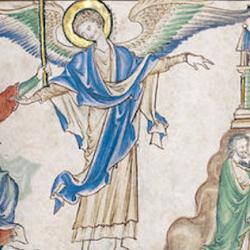When the Lamb appears in heaven, heaven bursts into song (Revelation 5).
After the seven trumpets (Revelation 8-11), John sees a long series of visions depicting the dragon’s various attacks on the church. When the saints have all been safely harvested and raised above the firmament, they burst into song (Revelation 15).
After the seven bowls (Revelation 16), John sees a series of visions of a harlot city being destroyed (Revelation 17-18). When that’s all finished, again the saints burst into song (Revelation 19:1-7).
Each of these is a Sabbatical moment. The morning stars sing together, as they did on the day when creation was completed.
When the Lamb has finished opening the seven seals (Revelation 6-7), however, there is no song. Instead there is “silence in heaven for a half hour” when the seventh seal is broken (8:1). Whatever else that means, it means that the seals don’t reach Sabbath.
The opening of the seals bring provisional judgments, but when all the seals have been opened, “the end is not yet” (cf. Matthew 24:6). The seals are only the beginning of birth pangs not yet a birthday.
This is a regular pattern in Scripture. Israel doesn’t sing until Pharaoh and his armies are drowned in the sea (Exodus 15). There is no song at the tabernacle, but only when David has brought Sabbatical peace to Israel in the land. Ezra lists singers among the returnees from exile, but they sing only during the dedication of the walls (Nehemiah 12).
Here’s a rule of thumb: Ends arrive when God’s judgments and saving acts are so utterly decisive that the saints cannot help but burst into praise.














